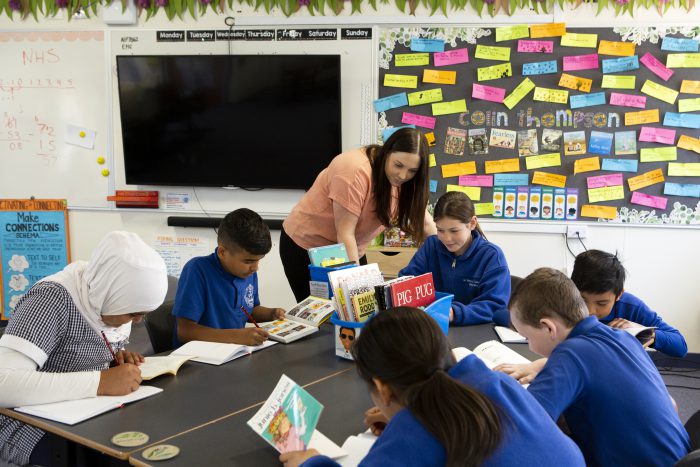
St Georges Road Primary School aligns its teaching of literacy to the Victorian Curriculum, ensuring that all students receive instruction targeting their current level of achievement. Our school follows a structured literacy program and also has a literacy intervention program which supports any readers who are not meeting or maintaining expected levels of achievement with small group sessions three to four times weekly.
For Foundation to Year 2, our literacy program focuses on developing foundational skills including daily phonological awareness activities, systematic and synthetic phonics instruction, explicit vocabulary instruction, and syntax and grammar instruction, all with the goal of achieving comprehension. Students use decodable readers to work on their knowledge of the letter-sound relationships in the English language and they encounter new letter-sound relationships through teacher-led instruction which is followed up with in-class and home reading.
All students in Foundation to Year 2 also encounter authentic literature through read-alouds, class discussions and theme-based knowledge units. Students study a theme for a number of weeks at a time, encouraging them to really understand what it is they are reading as well as building a knowledge base about the full range of topics outlined in the Victorian Curriculum at each year level. Writing instruction involves oral language preparation, handwriting, spelling, syntax and grammar instruction. Writing is taught from the sentence level to the multi-paragraph level in increasing complexity once students demonstrate their proficiency.
In Years 3 to 6, the literacy program builds upon these foundational skills, with an emphasis on critical thinking, analysis, and interpretation of texts. Aligned with the Victorian Curriculum, students explore a wide range of literary genres, including fiction, nonfiction, poetry, and drama. They learn to deconstruct texts, identify authorial intent, and construct well-supported arguments through reading, writing, and discussion activities. Theme-based knowledge units continue in Years 3 to 6 with a wide range of Victorian Curriculum topics taught in the literacy block, including themes encountered in Science, History and Geography.
Differentiated instruction is a key component of the literacy program, as teachers tailor their lessons to meet the diverse needs of students at varying levels of proficiency. Whether through targeted intervention for struggling readers or extension activities for advanced learners, every student receives the support and challenge they require to reach their full potential.
The integration of technology enhances the literacy program, with digital resources and tools providing interactive learning experiences that complement traditional teaching methods. Aligned with the Victorian Curriculum’s focus on digital literacy, students develop skills in navigating online texts, evaluating information sources, and producing multimedia presentations (Victorian Curriculum, 2024).
Through its comprehensive approach to literacy education, St Georges Road Primary School prepares students to meet the expectations outlined in the Victorian Curriculum while instilling a lifelong love for reading, writing, and communication. By nurturing strong literacy skills, the school equips students with the tools they need to succeed academically and thrive in an increasingly complex world.
